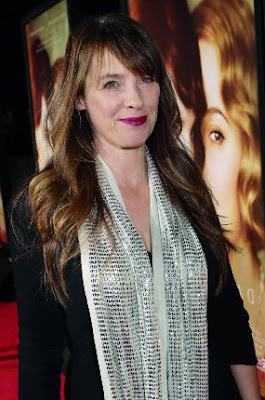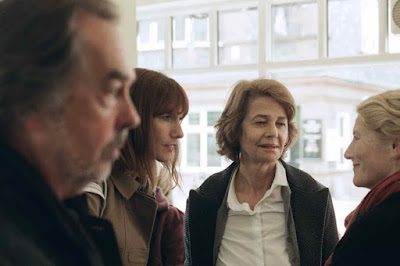Ms Vysotskaya keeps her character so on-track, truthful, angry and increasingly anguished that she carries us along moment to moment without missing a beat, as she's dragged kicking and screaming to confront who she is and what she has done.
The small-minded hypocrisy embedded in all of the apparatchiks we see in the movie, though first used for humor, satire and dark fun, pretty quickly becomes so nasty and self-serving that only, TrustMovies suspects, the very thick-skinned and nearly unfeeling among us will be able for long to continue viewing Dear Comrades! as black comedy. Or even as satire. It moves well beyond either.
The plot involves workers at a large factory going on strike and then demonstrating against the state. Which is of course ludicrous, as Russian workers under the Communist regime were always, according to the state, incredibly happy with their place in the overall scheme of things. (Just as the majority of Russian citizens today, as per their glorious current leader, are supremely blessed and content with Russia's brand of Capitalism.) How both the local powers-that-be, as well as the higher-ups in Moscow, handle this protest situation could hardly be worse.
The generation gap is also present and accounted for via Lyuda's daughter, whose disappearance during the protest sparks the remaining action of the film. Under whatever label you want to use -- political, religious, cultural -- how the elite and entitled evade, as they always do, in every country, the rules and restrictions that impede the rest of us, is brought to pulsating life (and death) in Dear Comrades!
One might accuse the filmmaker of sentimentality due to the ending of his film, which some audiences may interpret as a scene of hope but which just might be the darkest would-be joke in the entire movie. This is 1962, remember, and look what has happened in and to Russia since then. Hope may spring eternal. Unfortunately, so does despair.
Dear Comrade! is Russia's entry into this year's Best International Film "Oscar" race, but what its chances are, given our (one hopes) soon departing President's treasonous, term-long fellatio-flirtation with Vladimir Putin, this may not be the most popular of countries just now. Whatever happens, awards-wise, it's good to see Konchalovsky working so close to his optimal once again.
Distributed via Neon and running 121 minutes, the movie opens for an Oscar consideration week-long virtual run at New York City's Film Forum this Friday, December 25. Catch it now, or maybe later, when it reopens for a normal (what the hell does that mean, these days?) theatrical run.



























































